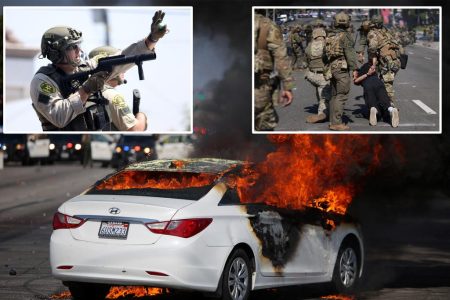The explosion of a Tesla Cybertruck outside the Trump International Hotel in Las Vegas on New Year’s Day 2021 initially raised concerns of a politically motivated attack, given the location and the vehicle’s association with Elon Musk, a close ally of then-President-elect Donald Trump. However, subsequent investigation revealed a deeply personal tragedy behind the incident. Matthew Livelsberger, a 37-year-old active-duty Army Special Forces soldier, detonated explosives inside the rented Cybertruck before taking his own life. Six days prior to the incident, his wife, with whom he shared a baby daughter, confronted him about suspected infidelity, leading to a heated argument and Livelsberger leaving their Colorado Springs home. This revelation shifted the focus of the investigation from a potential political act to a desperate act driven by personal turmoil.
Livelsberger, described as a “Rambo-type patriot” and staunch Trump supporter, rented the Cybertruck through the Turo app and drove to Las Vegas. While the choice of a vehicle associated with a Trump ally and the location of the explosion outside a Trump-owned property initially suggested a political motive, investigators are exploring the possibility that Livelsberger chose the Cybertruck specifically to minimize civilian casualties. The Cybertruck’s robust steel construction contained the blast, directing the force upwards and preventing significant damage to the hotel and potential harm to bystanders. Had a conventional vehicle been used, the explosion could have caused far greater damage and potentially resulted in fatalities within the hotel lobby.
The incident left seven people with minor injuries, but Livelsberger’s body was severely burned, requiring identification through his passport and Army ID found within the vehicle. His uncle, Dean Livelsberger, an Air Force veteran, confirmed Matthew’s patriotism and strong support for Trump, highlighting his extensive service in the Special Forces. This further complicated the narrative, blurring the lines between personal and political motivations. While Livelsberger’s political leanings were undeniable, the primary driver of his actions appears to be the personal crisis stemming from his marital problems.
The FBI, initially involved due to the potential political implications, investigated the possibility of a targeted attack against Trump or his associates. However, the emerging details of Livelsberger’s personal life and the circumstances leading up to the incident shifted the focus towards a theory of a personal breakdown leading to a tragic suicide. The choice of the Cybertruck, while initially suspicious, may have been a final act of consideration, minimizing harm to others even in his final, desperate act.
Livelsberger’s military background as a Special Forces soldier adds another layer of complexity to the case. His experience with explosives and his understanding of their destructive potential raise questions about the extent of premeditation and the specific choice of the Cybertruck. Was it a calculated decision to contain the blast and minimize collateral damage, or a symbolic act related to his political beliefs? The investigation sought to unravel these questions, examining the interplay between personal crisis, political ideology, and the potential for a final act of both destruction and restraint.
Matthew Livelsberger’s story ultimately highlights the complexities of human motivation and the challenges of disentangling personal struggles from broader societal or political contexts. The initial assumption of a politically motivated attack gave way to a narrative of a man grappling with personal demons, culminating in a tragic and violent end. The incident serves as a reminder that even seemingly straightforward events can have intricate and multifaceted origins, underscoring the importance of thorough investigation and a nuanced understanding of human behavior.










